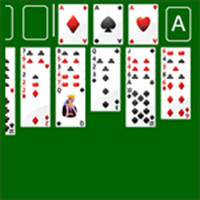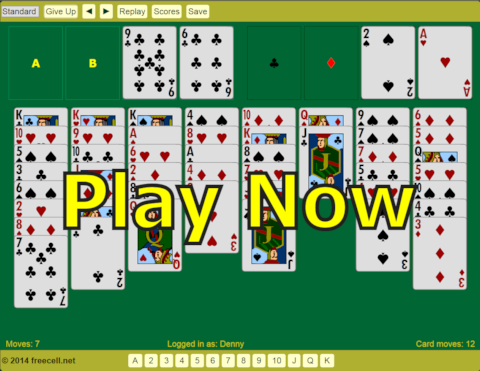Freecell
FreeCell Solitaire strategy
- Freecell is one of the most popular solitaire card games in the world. Like in Klondike Solitaire (a.k.a. Classic Solitaire) you're attempting to build up 4 suit piles called the foundations from Ace to King by suit. You have 8 columns on the lower part of the game screen known as the tableau.You can move cards between the columns to build them down from King to Ace.
- Use four extra cells to move cards around as you try to clear all cards from the table.
Evaluate the game before making any moves.

Look for Aces and other low numbers that are nested deep in the columns.
Sea Haven Towers is a solitaire game created by Art Cabral and is similar to Freecell, Eight Off, and Baker's Game. There are 4 temporary spaces and 4 foundations above the 10 columns of the tableau. Foundations are build up in suit from Ace to King.
Uncover the aces early.
Leave as many free cells as possible empty.
Try to create an empty column as soon as you can.
FreeCell and maximizing your memory
There have been recent studies that have shown that by keeping your brain challenged and engaged you can actually help to prevent Alzheimer’s disease. Playing freecell has been mentioned as one of the ways that you can help improve your memory.

A worry shared by many of us as we get older is that forgetfulness, which may feel increasingly pervasive as the years go by, will eventually lead to the loss of precious memories and the inability to remember new experiences in the future. Evidence suggests that the stereotype of the forgetful older person can become a self-fulfilling prophecy, leading older adults to perform more poorly in memory tests.
One recent study found that when older adults were read a paragraph describing research on age-related memory deficits, their subsequent memory was reduced for word lists they had learned previously. Thus, it is important to challenge the stereotype of inexorable age-related cognitive decline. Instead, we should be focusing on scientific evidence which suggests that, while various components of memory are affected by age, other aspects can remain relatively well preserved. By capitalising on the cognitive abilities that are comparatively resistant to ageing, it may be possible for older adults to develop effective strategies to make the most of their memories.
Source memory
Older adults can often remember a fact or detail, but attribute it to the wrong person, time or place. However, studies suggest that this source memory can be preserved when tasks focus on aspects of remembered information that they place greater value on. For example, thinking about the character of the person who is telling you a story, even if irrelevant to the story being told, may help you to remember who it was.
Cognitive abilities
The brain may be more resilient to the ageing process than we previously thought. These changes may result in preserved areas taking over the function of declining regions, or may indicate a shift in the way older people perform some tasks.
Attentional lapses
Another issue is that as we get older we can be susceptible to attentional lapses, whereby a simple lack of attention during key moments can lead to forgetfulness. Failure to recall whether or not you switched off the iron before leaving the room may not be due to a memory impairment, but to insufficient attention being paid to successfully encode the action.
Attentional lapses are most likely to occur during the everyday activities that we can accomplish on autopilot. A useful strategy to counteract such absent-mindedness can be to develop a method for performing such tasks: like always placing your keys in the same place.
What you can do
Freecell Download
There is a lot of hype about age-defying foods, herbal remedies and dietary supplements that can apparently boost brainpower. The popular media is full of suggestions that foods rich in omega-3 fatty acids (such as oily fish) can be beneficial for memory and can even reduce the risk of developing dementia. The established advice for getting the most from your memory as you age is to maintain a healthy, balanced diet; get plenty of physical exercise; and take steps to ensure you regularly get a good night's sleep. All three of these factors have been linked with an enhanced ability to recall information. It is also important to keep your social life as rich and varied as possible, and maintain involvement in hobbies and other intellectual pursuits. So in its own small way, freecell may indeed play a part in helping to maximize your memory potential.
FreeCell is the enormously popular solitaire game included with Windows. Because all cards are visible at the start of the game, it is almost entirely a game of skill. Almost all FreeCell positions can be won. The most notable exception is the game #11982 in Microsoft FreeCell and Pretty Good Solitaire.
Freecell Green Felt
In the video below, I show how to play FreeCell using the game Pretty Good Solitaire on Windows.
The rules of FreeCell can be learned in just a few minutes. It will take longer, however, to learn how to play well. Some players have played hundreds of thousands of games of FreeCell. It is possible to never lose unless you come upon a very rare unsolvable game. The key is to simply never give up. If you get stuck, undo your moves and start again. With Pretty Good Solitaire, it is possible to undo all of your moves, not just one.
Freecell Solitaire Green Felt Solitaire
FreeCell was invented in the early 1980s by Paul Alfille on the PLATO educational computer system at the University of Illinois. A intern at Microsoft, Jim Horne, then wrote a version of the game for Windows in 1990 that was eventually included in Windows 95. Since then the game has exploded in popularity, becoming one of the most popular solitaire games.